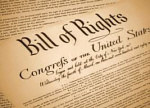

A War of Personal Freedom
![]()
Yoni Monat, Midyear 2013, January 2013.
JPFO preface: Yoni Monat is a sophomore, and managing ed of his paper --
and we feel this is is good, BALANCED journalism
This article is also available as a PDF file.
 The United States' Founding Fathers set up the 2nd Amendment to the Constitution in a purposely ambiguous fashion.
The United States' Founding Fathers set up the 2nd Amendment to the Constitution in a purposely ambiguous fashion.
Over the past 221 years, the 2nd Amendment's meaning has been debated passionately. Whether its framers would be pleased with the country's current gun laws is disputed with equal vigor.
The Founders' Intent
The Bill of Rights, which was adopted on Dec. 15, 1791, stated, " A well regulated militia being necessary to the security of a free state, the right of the people to keep and bear arms shall not be infringed." James Madison, who drafted the Bill of Rights, said, " [The Constitution preserves] the advantage of being armed, which the Americans possess over the people of almost every other nation ... [where] the governments are afraid to trust the people with arms." Thomas Jefferson, who authenticated the Bill of Rights as the Secretary of State, rhetorically asked, " What country can preserve its liberties if its rulers are not warned from time to time that their people preserve the spirit of resistance? Let them take arms."
The opinion holds that the right to keep and bear arms is among the most fundamental rights necessary to this Nation's system of ordered liberty. Hans von Spakovsky
Nelson Lund, Professor of Constitutional Law and the Second Amendment at George Mason University, says that Madison initially feared that a military sponsored by the federal government could oppress its people.
"But [Madison] also pointed out a decisive difference between America and Europe: the American people were armed and would therefore be almost impossible to subdue through military force," Lund said.
Interpretation
University of Chicago Law Professor Geoffrey Stone saysthat like one's 1st Amendment rights does not allow one to cause a panic by shouting " Fire!" in a theatre, the Founding Fathers intended for some limitations on the 2nd Amendment.
"Even if we agree that the Second Amendment forbids the government to 'infringe' the right to 'keep and bear arms,' that does not mean that the government cannot reasonably regulate the manufacture, sale, ownership and possession of firearms," Stone said.
Moving ahead to 1868, the 14th Amendment was created to protect individual freedoms, including the right to bear arms, from being cut down by the states, says Carl Bogus, Law Professor at Roger Williams University.
"One of the key reasons forgun control laws passed in the South after Reconstruction when Jim Crow was imposed was to take away the gun rights of black citizens so they would be defenseless in the fact of intimidation, assaults, and murders," Bogus said.
George Mason, who wrote the Virginia Bill of Rights in 1776, said, " To disarm the people -- that was the best and most effectual way to enslave them."
Recent History
Many of the strongest gun control restrictions have been enacted by city or state governments.
The District of Columbia's handgun ban was struck down by the Supreme Court in 2008, which ruled that bearing arms was an individual right for traditionally lawful purposes.
 However, justice Antonin Scalia, in the majority opinion, says that the ruling does not mean that one's 2nd Amendment protection is unlimited.
However, justice Antonin Scalia, in the majority opinion, says that the ruling does not mean that one's 2nd Amendment protection is unlimited.
"[It is] not a right to keep and carry any weapon whatsoever in any manner whatsoever and for whatever purpose," Scalia said.
Scalia specifically mentions the mentally ill and people while in schools and government buildings as among those whose gun access should be restricted.
Two years later, a case was centered on Chicago's firearms regulations, which included a handgun ban, impractical registration red-tape requirements, and burdensome annual fees for firearms owners.
McDonald v. Chicago made its way to the Supreme Court. Hans von Spakovsky, a Senior Legal Fellow at The Heritage Foundation's Center for Legal and Judicial Studies, says that the Court got the case right. "The opinion holds that the right to keep and bear arms is among the most fundamental rights necessary to this Nation's system of ordered liberty and is deeply rooted in our history and tradition," von Spakovsky said.Gun Control Measures
Charles Heller, President of Jews for the Preservations of Firearms Ownership, says that there should be very few reasons to have any limitations placed on one's gun use:
- Prior criminal gun use
- Mental incompetence, as declared by a court
- Being under age 18
Heller says that one is responsible for every shot one fires and that anybody in the government " who tries to remove a gun from you for any but the reasons above [should be] immediately imprisoned, and severely fined ... All other laws should be repealed."
Bogus says that Heller's limited guidelines for gun control interfere with legislation to potentially prevent gun-related tragedies such as the Dec. 14, 2012 shooting of 26 people in a Newtown, CT school by a mentally wayward man.
"Mass slaughters occur because madmen obtain dangerous weapons. The simple reality is that it is possible to control guns, but not possible to control emotionally disturbed people. We can't always identity them, and even when we can, we can't always predict if they will be dangerous," Bogus said.
The British are not coming ... We don't need all these guns to kill people. John Lewis
Fordham University Law Professor Nicholas Johnson says that the federal government's firearms supply, as compared to that of its people, has greatly increased."There was an essentially even balance in the 18th century.
"Today, the government's capabilities are overwhelming and achieving the 18th century balance would be untenable -- it would require an expansion of the capabilities of individual arms or a diminution in the armament of the state," Johnson added.
One suggested reason to enact stricter gun regulations now rather than in the past is the development of gun technology. However, Heller said, " No. Principles do not change with technology. It's like asking if the Talmud [Rabbinic commentaries on the Torah] would be better on an iPad."
Gun Law Debate
As for what the coming years will hold for the interpretation of the 2nd Amendment, vastly different views continue to take hold.
One month after the Newtown shooting, US President Barack Obama announced 23 executive orders, including limiting magazine rounds on guns, which he contends will reduce gun violence.
The National Rifle Association, a pro-gun-rights organization, said subsequently, " Attacking firearms and ignoring children is not a solution to the crisis we face as a nation.
The government [can] reasonably regulate the manufacture, sale, ownership and possession of firearms. Geoffrey Stone
"Only honest, law-abiding gun owners will be affected and our children will remain vulnerable to the inevitability of more tragedy," the NRA added.
Rep. John Lewis, D-GA, sees the US' citizens as safe from enemies and thus favors measures to further restrict access to certain types of guns. " The British are not coming ... We don't need all these guns to kill people," he said.
Heller says that citizens' having access to high-caliber weapons remains crucial today, 229 years after America won the Revolutionary War.
" 'The British' " is now our government, and if they ever attempt to overthrow The Constitution, it may be necessary to use deadly force on the agents that they send to destroy our liberty. At that time, you would want the best gun for the job," Heller said.
Future of Firearm Possession
von Spakovsky says that when the next lawsuit regarding gun rights reaches the Supreme Court, it is unlikely that the majority opinion will be similar to that in McDonald. He reasons this because Justice Elena Kagan, prior to her appointment by Obama in 2010, drafted an executive order to restrict certain semiautomatic rifles and compared the NRA to the Klu Klux Klan in a memo.
He reasons this because Justice Elena Kagan, prior to her appointment by Obama in 2010, drafted an executive order to restrict certain semiautomatic rifles and compared the NRA to the Klu Klux Klan in a memo.
"Kagan was apparently thus so hostile to gun rights that she compared the biggest gun-rights organization in the U.S. to one of the most vicious and despised racist hate groups in our history," von Spakovsky said.
Stone says that the NRA is to blame for skewing the intent of the 2nd Amendment, preventing legislation that would make firearms more difficult to access.
"Those who oppose stricter gun laws have organized, they have aggressively promoted their positions, and they have been extraordinarily effective in electing candidates who support their policies and defeating those who oppose them," Stone said.
Hubert Humphrey, US Vice President from 1965-1969 and, like Kagan, a Democrat, says that protecting individuals' 2nd Amendments rights is critical.
What country can pre- serve its liberties if its rulers are not warned from time to time that their people preserve the spirit of resistance? Let them take arms. Thomas Jefferson
"Certainly, one of the chief guarantees of freedom under any government, no matter how popular and respected, is the right of the citizen to keep and bear arms," Humphrey said.
Although the precise intentions of the Founding Fathers will never be fully known, they would now undoubtedly recommend that lawmakers debating gun regulation on Capitol Hill and in state houses nationwide consider the words of one of the most powerful government leaders of the 20th century."The most foolish mistake we could possibly make would be to allow the subject races to possess arms. History shows that all conquerors who have allowed their subject races to carry arms have prepared their own downfall by so doing."
That commentary belonged to Adolf Hitler.
![]()



































